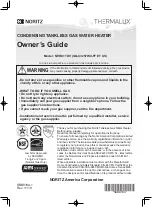
5168274-BIM-I-1121
44
Johnson Controls Ducted Systems
RAT+
Return Air Temperature sensor input from 10K
Ω
@ 77°F, Type III negative temperature coefficient
thermistor
Input required for operation; 3.625 VDC reading RAT+ to RAT
–
with open circuit. Used in return air enthalpy calculation.
Substitutes for space temperature if no other space
temperature input is present.
OAT+
Outside Air Temperature sensor input from 10K
Ω
@ 77°F, Type III negative temperature coefficient
thermistor
Input required for operation but may be a communicated value;
3.625 VDC reading OAT+ to OAT
–
with open circuit. Used in
heat/cool cutouts, low ambient cooling determination, dry bulb
free cooling changeover, outside air enthalpy calculation,
economizer loading operation, heat pump demand defrost
calculation.
CC1+
#1 refrigerant circuit Condenser Coil temperature
sensor input from 10K
Ω
@ 77°F, Type III negative
temperature coefficient thermistor
Input required for heat pump units, not required for A/C units;
3.625 VDC reading CC1+ to CC1
–
with open circuit. Used in
heat pump demand defrost calculation.
EC1+
#1 refrigerant circuit Evaporator Coil temperature
sensor input from 10K
Ω
@ 77°F, Type III negative
temperature coefficient thermistor
Input required for operation; 3.625 VDC reading EC1+ to EC1
–
with open circuit. Used in suction line temperature safety.
CC2+
#2 refrigerant circuit Condenser Coil temperature
sensor input from 10K
Ω
@ 77°F, Type III negative
temperature coefficient thermistor
Input required for 2-compressor heat pump units, not required
for 2-compressor A/C units, not active for 1-compressor units;
3.625 VDC reading CC2+ to CC2
–
with open circuit. Used in
heat pump demand defrost calculation.
EC2+
#2 refrigerant circuit Evaporator Coil temperature
sensor input from 10K
Ω
@ 77°F, Type III negative
temperature coefficient thermistor
Input required for operation of 2-compressor units, not active for
1-compressor units; 3.625 VDC reading EC2+ to EC2
–
with
open circuit. Used in suction line temperature safety.
Pinned connections on right edge of UCB
RAH+
Return Air Humidity input from 0-10 VDC @ 0-
100% RH sensor
Input required for reheat units, optional in all other units, may be
a communicated value. Used in return air enthalpy calculation,
temperature/humidity setpoint reset, reheat operation.
DCT PRS+
Supply Duct Pressure input from 0-5 VDC @ 0-5”
w.c. sensor
Input required for variable air volume units. Used in VAV indoor
blower operation.
DFS (upper pin)
24 VAC hot return from Dirty Filter Switch
Optional input; switch closure for greater than 15 seconds
during indoor blower operation initiates a notification alarm
DFS (lower pin)
24 VAC hot out for Dirty Filter Switch
Connects through circuit trace to the R terminal
APS (upper pin)
24 VAC hot return from Air Proving Switch
When this optional input is enabled: the air proving switch must
close within 30 seconds of initiation of indoor blower operation
and not open for greater than 10 seconds during indoor blower
operation to allow heat/cool operation and prevent an “APS
open” alarm; the air proving switch must open within 30
seconds of termination of indoor blower operation to prevent an
“APS stuck closed” notification alarm
APS (lower pin)
24 VAC hot out for Air Proving Switch
Connects through circuit trace to the R terminal
C
Common for the VFD output
Negative of the VDC circuit for the VFD output
VFD
2-10 VDC (0-100%) output for the indoor blower
Variable Frequency Drive
Output is active with indoor blower operation. For CV units: this
output provides stepped IntelliSpeed control of the indoor
blower VFD based on fan-only, cooling stage and heating stage
outputs. For VAV units: this output provides control of the indoor
blower VFD based on supply duct static pressure input and
setpoint.
VFDFLT
24 VAC hot input from the normally open VFD
alarm contact
The VFD alarm contact switches from R within the unit wiring
harness. 24 VAC input results in unit shutdown and a “VFD
fault” alarm
Terminal at lower right corner of UCB
Table 19: Smart Equipment™ UCB Details (Continued)
Description
Function & Comments










































